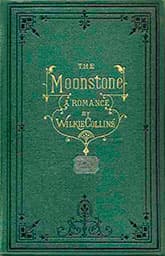The Moonstone
Critique • Quotes
 First one-volume edition, 1871
First one-volume edition, 1871First publication
1868, serialized in magazine All the Year Round
First book publication
1868
Literary form
Novel
Genre
Literary, mystery, crime
Writing language
English
Author's country
England
Length
Approx. 174,000 words
Notable lines
I address these lines—written in India—to my relatives in England.
My object is to explain the motive which has induced me to refuse the right hand of friendship to my cousin, John Herncastle.
— Prologue: "The Storming of Seringapatam", first lines
In the first part of Robinson Crusoe, at page one hundred and twenty-nine, you will find it thus written:
"Now I saw, though too late, the Folly of beginning a Work before we count the Cost, and before we judge rightly of our own Strength to go through with it."
— First Part: "The Loss of the Diamond", first lines
We had our breakfasts—whatever happens in a house, robbery or murder, it doesn't matter, you must have your breakfast.
Rosanna Spearman had been a thief, and not being of the sort that get up Companies in the City, and rob from thousands, instead of only robbing from one, the law laid hold of her, and the prison and the reformatory followed the lead of the law.
Your tears come easy, when you're young, and beginning the world. Your tears come easy, when you're old, and leaving it.
I am (thank God!) constitutionally superior to reason.
I am an average good Christian, when you don’t push my Christianity too far. And all the rest of you—which is a great comfort—are, in this respect, much the same as I am.
The Christian Hero never hesitates where good is to be done.
Once self-supported by conscience, once embarked on a career of manifest usefulness, the true Christian never yields. Neither public nor private influences produce the slightest effect on us, when we have once got our mission. Taxation may be the consequence of a mission; riots may be the consequence of a mission; wars may be the consequence of a mission: we go on with our work, irrespective of every human consideration which moves the world outside us. We are above reason; we are beyond ridicule; we see with nobody’s eyes, we hear with nobody’s ears, we feel with nobody’s hearts, but our own. Glorious, glorious privilege!
We often hear (almost invariably, however, from superficial observers) that guilt can look like innocence. I believe it to be infinitely the truer axiom of the two that innocence can look like guilt.
Yes! after the lapse of eight centuries, the Moonstone looks forth once more, over the walls of the sacred city in which its story first began. How it has found its way back to its wild native land—by what accident, or by what crime, the Indians regained possession of their sacred gem, may be in your knowledge, but is not in mine. You have lost sight of it in England, and (if I know anything of this people) you have lost sight of it for ever.
So the years pass, and repeat each other; so the same events revolve in the cycles of time. What will be the next adventures of the Moonstone? Who can tell?
— Last lines
Critique • Quotes

